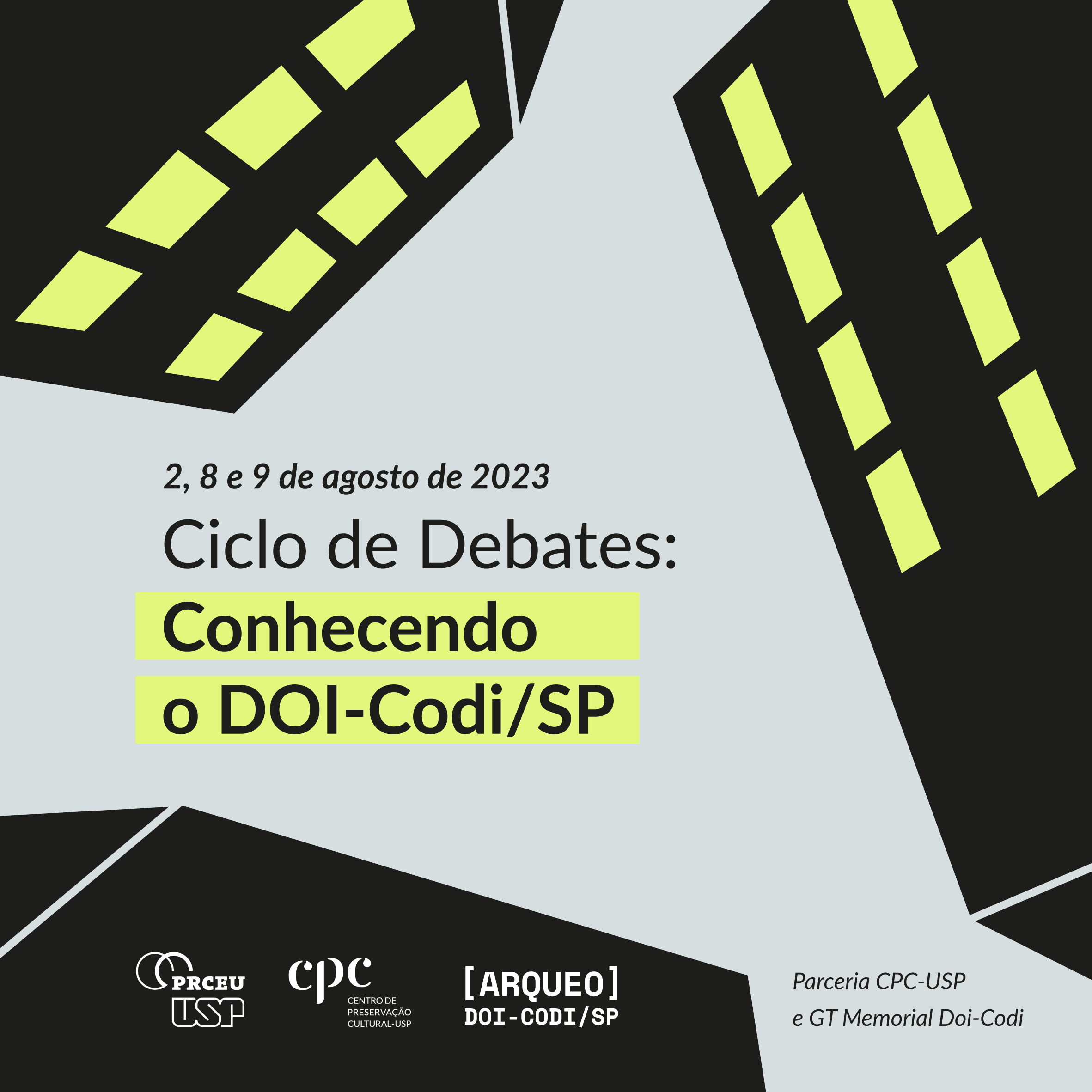Experts, researchers, human rights activists and former political prisoners discuss state repression in the series of debates “Conhecendo o DOI-Codi/SP”
The face-to-face debates began on Wednesday (2) and will continue on August 8 and 9 at Casa de Dona Yayá, the headquarters of Centro de Preservação Cultural da USP (CPC-USP). The event, held in partnership with the Grupo de Trabalho Memorial DOI-Codi/SP and coordinated by historian Déborah Neves, aims to broaden knowledge about what this agency was, its activities, its impact to this day and the importance of research into this period of Brazilian history. Participation, with the award of certificates, is subject to prior registration.
DOI-Codi is the acronym by which the Destacamento de Operações de Informação – Centro de Operações de Defesa Interna became known, a repression agency subordinate to the Brazilian Army that operated during the dictatorship established after the 1964 military coup. The DOI-Codi emerged from the Operação Bandeirante (OBAN), created in 1969, the harshest period of political repression, to coordinate and integrate the actions of the repression agencies against left-wing individuals or organizations that posed a threat to the maintenance of the regime. Destacamento de Operações de Informação (DOI) was responsible for the practical actions of searching, seizing and interrogating suspects, and the Centro de Operações de Defesa Interna (CODI) for analyzing information, coordinating the various military bodies and strategically planning the fight against left-wing groups. Although they were two separate bodies, they were often associated under the acronym DOI-Codi, which reflected the complementary nature of the two bodies.
In São Paulo, the facilities were located on Rua Tutóia, in the Paraíso neighborhood, where the 36th Police District is currently located. Colonel Carlos Alberto Brilhante Ustra, then 38, was in charge in the São Paulo capital. Until 1974, when Ustra was transferred to Brasilia, 2,000 prisoners were held in the unit, including Vladimir Herzog, journalism director of TV Cultura, who was tortured and murdered after voluntarily coming forward to give evidence after being summoned.
These and other episodes, which have been duly investigated and documented, confirm that the DOI-Codi were indeed places where those who opposed the civil-military dictatorship in Brazil were tortured.
The event “Conhecendo o DOI-Codi/SP” is part of the archaeological research project that will take place until August 14 at the former DOI-Codi facilities in São Paulo, carried out by LAP/Unicamp, LEAH/Unifesp and DAA/UFMG, with funding from CNPQ and Unicamp’s Human Rights Executive Board. As well as on-site research, workshops will be offered to train primary and secondary school teachers.
Professor Flávia Brito do Nascimento, director of the CPC-USP, stresses the importance of preserving the memory of this dramatic period: “It is an honor to open this space for reflection on the acts of repression that affected the whole of Brazilian society, especially intellectuals, academics and students. The memory of the Universidade de São Paulo is also marked by cases of disappearance and murder of students, teachers and staff, reported very seriously by the Comissão da Verdade da USP (USP Truth Commission), created in 2013 to examine and clarify these serious violations of human rights practiced between 1964 and 1985.”
Service
Conhecendo o Doi-Codi/SP
- August 8 (Tuesday), from 7 pm to 9:30 pm
Aparato policial na lógica da tortura, ontem e hoje
Mediation: Deborah Neves, coordinator do GT Memorial DOI-Codi/SP
Invited: Valéria Oliveira, Mães de maio/CAAF; Célia Rocha Paes, architect, ex-political prisoner; Marcelo Godoy, journalist, author of the book A casa da vovó (2015); Moacyr Oliveira, director of journalism of Associação Brasileira de Imprensa (ABI), advisor to the presidency of Empresa Brasil de Comunicação (EBC), ex-political prisoner.
- August 9, 2023 (quarta-feira) from 2 pm to 5 pm
Novos olhares sobre a ditadura e o vivido no DOI-Codi
Mediation: Sônia Fardim, historian
Invited: Janice Theodoro, Full professor of USP, ex-political prisoner; Célia Rocha Paes, architect, ex-political prisoner; Ana Paula Brito, museologist and historian, coordinator of the Rede Brasileira de Pesquisadoxs de Sítios de Memória e Consciência (Rebrapesc).
Free registration through the electronic form
Day 8/8: https://forms.gle/D7m63AyRG8VmCE5s7
Day 8/9: https://forms.gle/TKBmg52633oK1HqY9
Local: CPC-USP/Casa de Dona Yayá
Rua Major Diogo, 353 – Bela Vista – São Paulo
Translated by: Lara Yoshime Shizuko Fukushima





